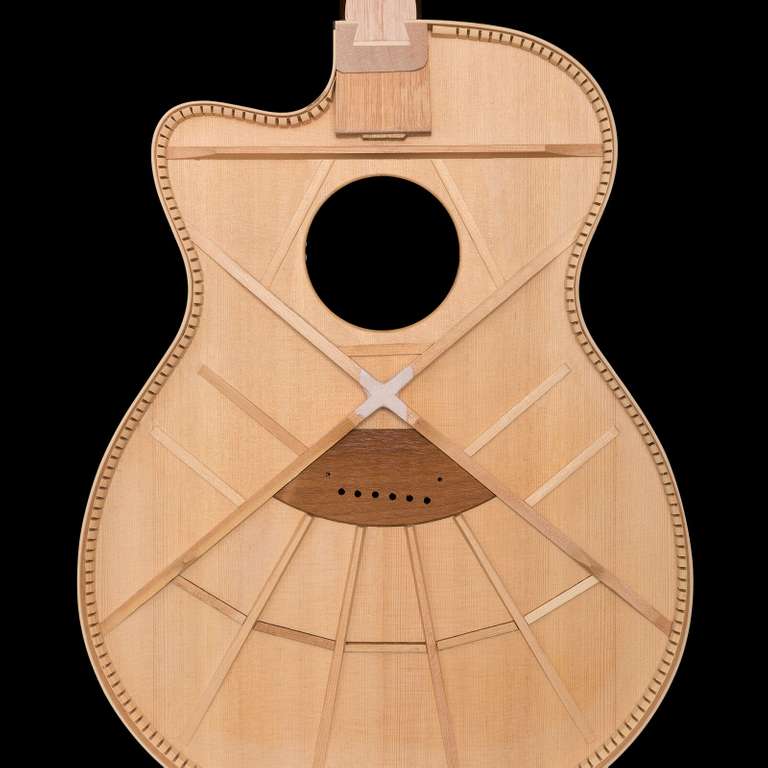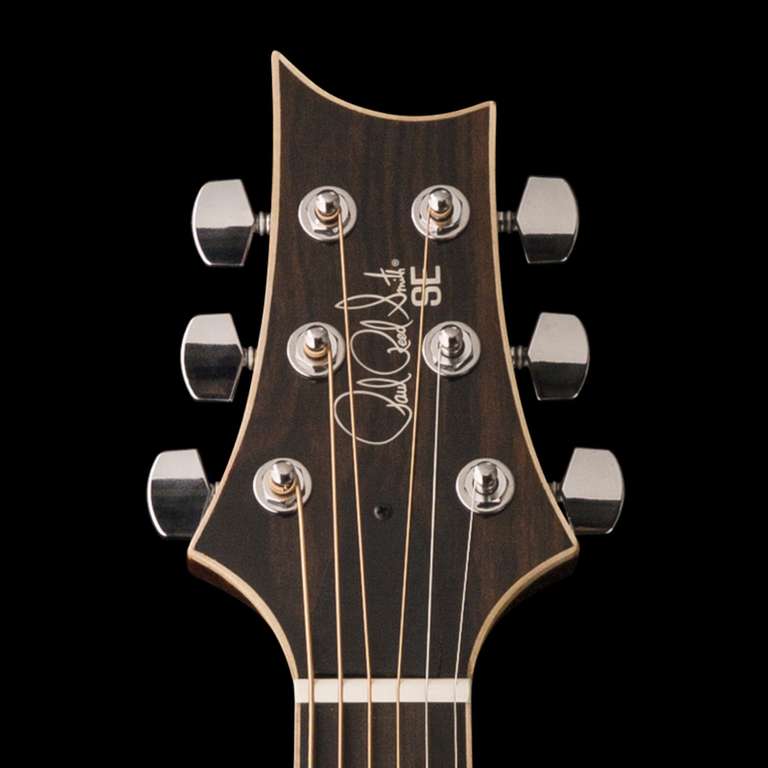PRS AE60ENA SE A60 Angelus Acoustic Guitar w/ Electronics, Spruce Top, Zir b/s, Natural
- Vendor
- PRS
- Regular price
- $1,129.00
- Sale price
- $1,129.00
- Regular price
-
$1,129.00 - Unit price
- /per
Adding product to your cart
- Description
- More
- Features
- Specs
- Inspection and Set-up
- Humidity Care
*These are stock photos. For actual photos of the instrument, please contact us.
Full, Vintage Tone
The PRS SE A60E pairs ziricote back and sides with a solid spruce top. The tone favors a full bottom end with rolled-off highs reminiscent of some vintage acoustic guitars. When matched with PRS hybrid “X”/Classical bracing, which allows the top to freely vibrate, the SE A60E’s voice projects with breathtaking volume and delicate nuance. The Angelus Cutaway body shape delivers comfort and playability, well suited for picking and fingerstyle playing.
- CASE/GIG BAG: Hardshell case included.
Plugged in, the PRS-Voiced Fishman Sonitone pickup system delivers dynamic, organic tone and allows players to easily take this guitar from rehearsal to the stage. This electronics system features an undersaddle pickup and soundhole mounted preamp with easy-to-access volume and tone controls.
The SE A60E is beautifully appointed with abalone and figured maple accents. Additional high-quality features include a solid spruce top, ebony fretboard and bridge, bone nut and saddle, as well as PRS trademark bird inlays and headstock design.
PRS Hybrid “X”/Classical Bracing Pattern
With an “X” brace behind the bridge for support and classical fan bracing on the belly of the guitar, PRS’s acoustic top bracing pattern allows the guitar’s top to freely vibrate and project, resulting in a powerful and unique voice.
Bone Nut and Saddle
PRS acoustics feature bone nuts and saddles. Bone is a hard material (that can still be shaped to fit) and helps the guitar to sustain longer with more tonal character.
Pickup/Electronics
EQ’d in Paul Reed Smith’s home studio and implemented by Larry Fishman and his engineering team, the PRS-Voiced Fishman Sonitone Pickup provides players with a warm, organic tone that allows the natural sound of the instrument to come through.
- BODY
- Top Wood Solid Sitka Spruce
- Middle Wood Ziricote
- Back Wood Ziricote
- Body Shape Angelus Cutaway
- Body Depth at Neck Block 3 19/32”
- Body Depth at Tail Block 4 3/8”
- Bracing PRS Hybrid “X”/Classical Bracing
- Body Purfling Abalone
- Body Binding Curly Maple
- Rosette Black/Abalone
- NECK
- Number of Frets 20
- Scale Length 25.3”
- Neck Wood Mahogany
- Neck Shape Wide Fat
- String Spacing 2 7/32”
- Fretboard Wood Ebony w/ Curly Maple Binding
- Fretboard Inlay Abalone Birds
- Fretboard Radius 11.81"
- Strength/Truss Rod Adjustable
- Neck Depth At The Nut 7/8”
- Width of Fretboard at the Body 2 9/32"
- Width of Fretboard at the Nut 1 11/16"
- Nut Bone
- HARDWARE
- Bridge Wood Ebony
- Tuners PRS-Designed
- Acoustic Saddle Bone
- Acoustic Strings .012-.053
- Included Accessories Hardshell Case
- ELECTRONICS
- Pickup PRS-Voiced Fishman Sonitone with Soundhole-Mounted Volume and Tone Controls
At Easy Music Center, we care for our instruments from the moment they arrive to when they ship to your door. All instruments are stored in a climate controlled environment and put through a 12-point inspection checklist before being shipped.
First, we check the finish of the instrument, carefully inspecting any blemishes on the surface. Next, we check the playability and setup by inspecting and adjusting the truss rod (if available), bridge, nut, and frets to manufacturer factory specifications. Any request made outside of manufacturer factory specifications can incur additional charges for parts and labor. If the instrument has electronics, we test all of the electronic components to make sure they are functioning properly.
After a thorough inspection, we then move on to maintenance. We start by lubricating any moving parts on the instrument, such as tuning machines. We then move on to cleaning and oiling the fretboard along with the frets.
Once maintenance is done, we stretch and tune the strings and play test the instrument. After this, we do a final inspection and clean/detail the instrument before packing it up for shipment.
We’re excited to be a part of your instrument buying experience.
Acoustic guitars and ukulele are made of wood, and wood is sensitive to changes in climate. Shifts in temperature or relative humidity can affect your instrument in multiple ways, some of which can lead to costly repairs if you’re not careful. Solid woods in particular are especially prone to the effects of climate fluctuation. For example, extended exposure to low relative humidity (below 40% RH) can dry out the wood, causing it to shrink and run the risk of cracking. Similarly, excessive humidity can cause the wood to absorb moisture and swell, potentially causing other problems. Without adequate humidity control (especially in drier local climates), acoustic instruments can crack and their necks can warp, causing problems with fretting, intonation and playability.
So how do you prevent this kind of damage? Easy: by keeping your guitars and ukulele properly humidified (ideally between 40-60% RH). The easiest way to do this is by storing your instruments in a case with a case two-way humidifier inside. A two-way humidifier will slowly absorb or release moisture inside your case, maintaining humidity to help ensure your instrument doesn’t suffer damage. Using a digital hygrometer can help you monitor humidity levels around your instrument.
Symptoms of a dry acoustic instrument:
- Low action. Strings are very close to the fretboard.
- Hump on the fretboard where the neck joins the body.
- Sunken top across the soundboard between bridge and fingerboard.
- The back of instrument looks very flat when it is dried out.
- Sharp fret ends extend beyond the edge of the fretboard.
- The plane of the neck angle on a dry instrument hits above the top of the bridge.
Symptoms of a wet acoustic instrument:
- High action. Strings that are unusually high off the fretboard, making it difficult to play.
- Unusually swollen top
- Unusual warp on the top, back or both at the end-block
- Improper neck angle. Sighting the neck to the bridge, the frets will appear to hit below the bridge.
The D’Addario Two-Way Humidification System
Using patented technology, the D’Addario Two-Way Humidification System features disposable, moisture-filled packets with a breathable membrane that provides two-way humidity control, meaning it can either release or absorb moisture to consistently maintain a predetermined relative humidity (RH) level of 45-50 percent.
Music Nomad Humilele Ukulele Humidifier
Music Nomad the leader in equipment care products, has developed an easy to use, no mess, and low maintenance Ukulele humidifier. The Humilele rests securely on top of the strings to safely and evenly hydrate your Ukulele to avoid these problems.
Final Notes on Humidity Control
To monitor the amount of humidity your instrument is receiving, we recommend the purchase of a digital hygrometer, a device that gauges and provides a read-out of humidity levels. It can be kept in the room where you store your instruments, or, better yet, in a central location inside the instrument case, preferably Velcro’d to the outside of the accessories compartment (facing the heel). The optimal range for your guitars and ukulele is 45-55% RH.








